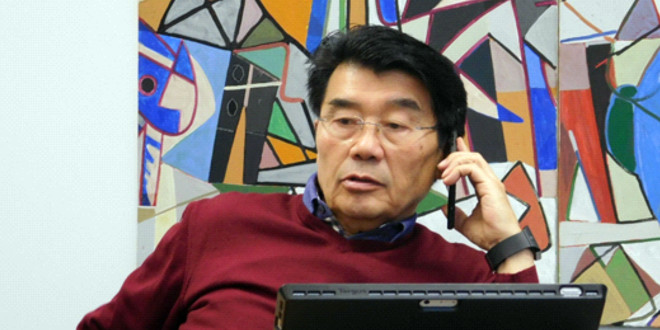 Ermurat Bapi interviews Akezhan Kazhegeldin.
Ermurat Bapi interviews Akezhan Kazhegeldin.
Q. In a recent interview in Novaya Gazeta Kazakhstan, you commented disparagingly on the last constitutional reform. By contrast, the Kazakh mass media are talking about a voluntary transfer of presidential power to the parliament – a transition to a new kind of republic, the beginnings of a "transit of power". So what's going on? Have those who are hailing the changes to the constitution really missed the point entirely, or are they deliberately trying to deceive us?
A. It's not so black-and-white. There are some who don't understand, and yet are lying at the same time. I hope I can demonstrate that the manipulations which have taken place do not represent real reform. Quite the opposite – they've been cooked up to ensure the preservation of the status quo.
Most likely, when President Nazarbayev recorded his first dramatic TV address to the nation, with its dire warnings of imminent serious events, he was intending to announce a real transfer of his own power – the so-called "transit".
Details are even known of how he was proposing to do this. But then he allowed himself to be persuaded against it. His family and his closest and most trusted associates came to him and said, "But have you thought about us, about our children? Sure, your place in the history books is assured, but what are we going to do?"
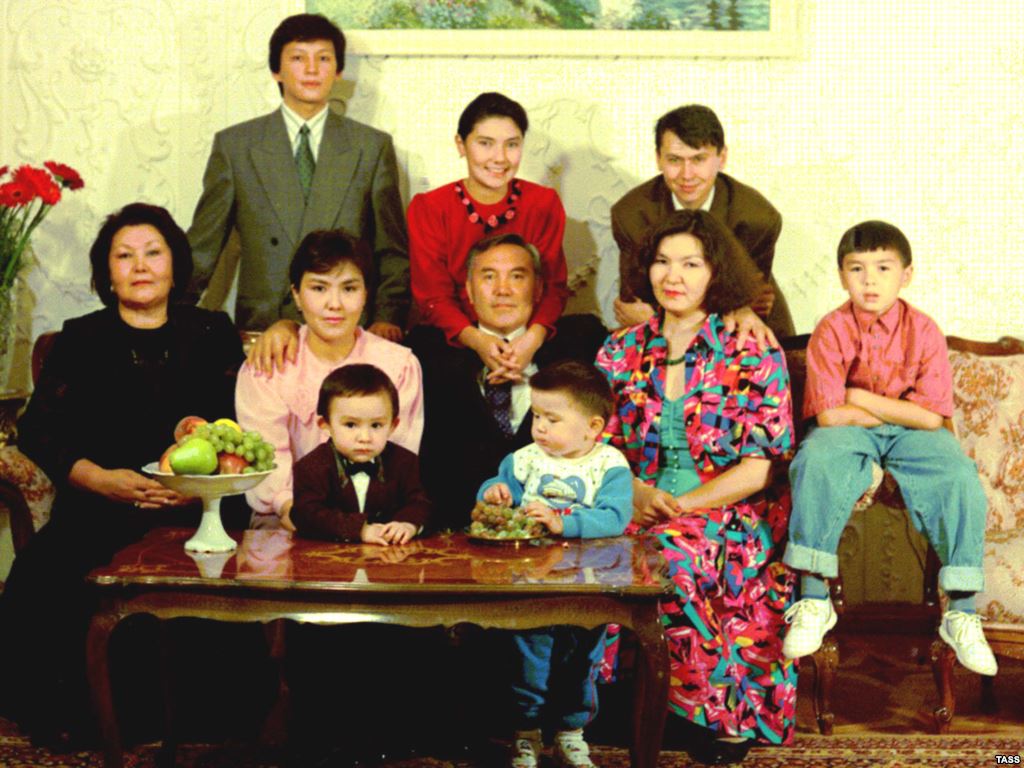
[Image: The Nazarbayev family]
Q. So you're saying that no transit of power seems likely. Moreover there's no sign whatsoever of a clear plan for the transfer of power from President Nazarbayev to a successor?
A. A transit of power in Kazakhstan will happen in any case – because you cannot just cancel the laws of nature or social development. There are most probably some plans rolling around in President Nazarbayev's head, that will ripen at some time or another. But I think it is unlikely that a transit of power will come about as a result of such plans. Nursultan Nazarbayev will most likely lack the nerve to carry them through while he's still at the peak of his power. And later he will lack the political power to follow through on his ideas.
Many different plans exist for the transit of power – far more than just the plans of the Kazakh president. Nor is it only those in the corridors of power who are generating them. Let me be more specific. Beyond the presidential administration and his close circle there are plans being hatched which have a far greater chance of coming to fruition.
Q. Who is devising such plans? Is it business groups close to the President? Regional elites? Religious leaders? Even if there's no actual Masonic lodge in Kazakhstan...
A. We've got plenty of secretive groups of our own without the need for Masonic lodges. Just take a look at the process involved in filling the top posts in government departments and the regions. Officials get appointed on the basis of their personal devotion to the head of department and the principle of collective responsibility. The question of what happens on the dread day their godfather conks out is a matter of life or death to the entire clan. One of them will have a plan, and it is quite possible that it will be realised.
Here we are not talking about the so-called "close circle" of the President – the super-wealthy super-cronies who weave their way from one top post to the next. Frankly, that network of people has no chance whatsoever of realising their plans anyhow. They've lived their whole careers as the yes-men of the presidential hierarchy, and their dearest dream is that their house of cards will stand forever. Politically they are so flaccid – addicted to their lives of opulence and indulgence – that it's simply unimaginable to suggest they might ever constitute the country's future.
But they are skilled manipulators who have spent decades vying for the strings of presidential power, trying to get their hands on state budgets and state property. No matter who the new president might be, they'll square off against each other for a place in the new "close circle" which will inevitably form around the new head of state.
This all means that any plans for the future that emanate from the "close circle" can safely be totally ignored. They are cronies without a future. Without wanting to stoke fear, look at how the transit of power took place in Uzbekistan. And what happened to the "close circle" of their late president. Let alone the outer darkness into which Turkmenbashi's cronies were cast when he died. Even their graves are unmarked, ya Allah!
Q. What role do you see for "big business" in Kazakhstan during the transfer of power? Should we really be writing off those people who, even officially, have several billion dollars? The continuation of their businesses requires stability and confidence.
A. Sure, if we were living in a country with a market economy, that's how things would be. But in Kazakhstan "big business" just means that same "close circle". The Prime Minister is also a billionaire. The Secretary of State is also a top banker. The Minister of Natural Resources also mines uranium. Even the President's son-in-law receives a 25 percent payment for every tonne of oil produced.
Can we really compare this billionaire bunch with business leaders who set up their own companies in an arena of free competition and take them to the top? Now I come to think of it, the President had another son-in-law who was a charming business leader and also Head of the Secret Police... Yet once the divorce papers were filed, his business acumen mysteriously evaporated.
The only thing such businessmen-cum-functionaries are any good at is the next bout of wrestling – to get their mitts on the latest tranche of budgetary cash. They have no ethics whatsoever, and no kind of gentlemen's code regulates their operations. They simply roam the planet in the hope of protecting their ill-gotten gains.
Q. Is there any kind of role in the selection of a new leadership to be played by the "oligarchs", the foreign owners of raw material assets – I mean the "Eurasian troika", or Vladimir Kim from Kazakhmys?
A. There is no role for them whatsoever. These companies are in sharp decline. On top of that, they have been weakened by their ongoing struggle with individuals from the close circle. This may seem paradoxical, since the President ought to have a strong interest in these pillars of the national economy. But nevertheless....
It's well known that a few years ago, ENRC and the "Eurasian troika" came in for a humiliating bashing and exposure in the Western press. The revelations led to formal investigations by British officialdom and to ENRC beating a shameful exit from the London Stock Exchange.
It is equally well known who was behind the leaks in those attacks: Nazarbayev's own close circle, naturally. Their aim was to smear the troika in the eyes of Western business leaders and strong-arm President Nazarbayev into handing control of ENRC to a specific Western commodities trader. In the process they pocketed multi-million sums in backhanders. And, of course, the whole thing was presented as being for the protection of national interests and the interests of Nursultan Nazarbayev himself.
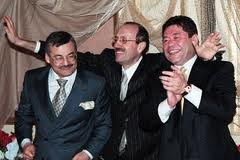
[Image: Alijan Ibragimov, Alexander Mashkevich and Patokh Shodiev]
Despite all this, ENRC has been running its business ineffectively all these years. Corporate abuse in the company is rife – it is becoming poorer, while its owners become billionaires. The main sin is that the troika has yet to fulfil its investment commitments. At the time, the company was proffered the enterprises and their raw materials not without reason, but on the guarantee that they would plough fresh capital into the business for modernisation, creating new enterprises and bringing in new technology. None of that has been done. This means the first job is to nationalise the troika's assets, determine what is actually now left, and then come up with a fresh ownership plan for the structure of this vast conglomerate.
On paper there is potentially a large national investor – the Kazakh National Pensions Fund. If professional and transparent expert management were put in place, no foreign trader would be needed at all. Twenty-five years ago we didn't have any capital, or any market position either. We now have both. We need to take the same approach with Kazakhmys and the national oil and gas assets: kick the crooks out and put them under parliamentary control.
Meantime, the troika has lost vast sums as a result of leaving the London Stock Exchange. And Kazakhstan ends up the loser, as officially it is the joint owner.
This kind of "tussle for resources" is taking place under the aegis of the sitting President. So just imagine the mayhem that would result if there wasn't anyone to fear. That means that no matter how weary Nursultan Nazarbayev may be of the reins of power, he will never entrust it to functionary oligarchs. Any one of them might be brought to criminal trial in the West. Under threat of confiscation of their assets they will forget their oaths of presidential allegiance to turn stool pigeon for the investigators.
Q. Some political commentators are talking about Karim Masimov as the most likely "moderator" for the transfer of power – considering his experience in the country's governance and administrative resources. What do you think about that?
A. It's rather unclear how such administrative resources could be measured. There are reports in the Western media that Kazakhstan's former PM is now facing criminal investigation in France in connection with USD 12 million dollar bribe allegations over state procurement contracts for billions of dollars' worth of helicopters. Even Masimov himself does not deny it.
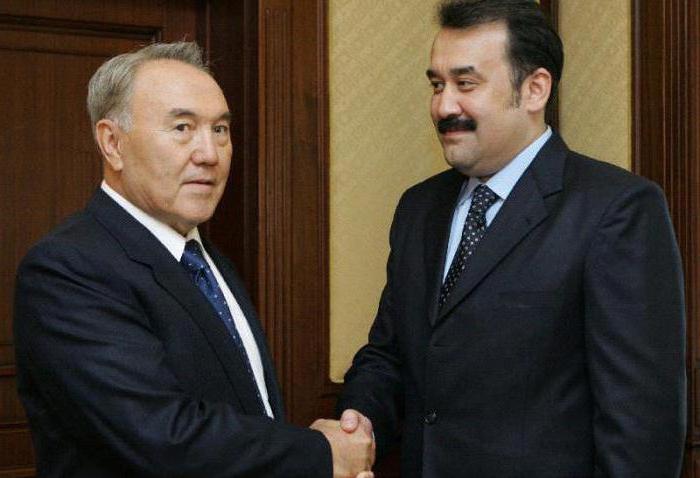
[Image: Nursultan Nazarbayev and Karim Masimov]
This is the main reason the President moved Karim Masimov to the Intelligence Corps, where he won't have to travel to the West. Even so, it is unclear how he will collaborate with colleagues from other countries over questions of fighting against money-laundering or illegal capital flight. Western colleagues know all about the money-laundering and capital holdings of Kazakhstan's top officials.
Even if French politicians decide to leave the former Prime Minister be, the journalists and private investigators won't let the matter rest and will continue to drag his name through the mud.
Q. From what you're saying, even apparently irresolvable paradoxes won't prevent the onset of political reform in Kazakhstan and the transfer of power. Could this even be a sort of "in-born curse"?
A. If it were only a curse, things would be simpler. We'd simply recruit an exorcist, he'd cast out the evil, we'd make offerings to the heavens and life could continue. Our curse is more intractable, and involves the inextricable fusion of power and cash. Power has long been a route to riches in free Kazakhstan – and then the riches are used to acquire even greater power. If power passes to new people, what's going to happen to the funds siphoned off from the budget and the embezzled natural resources?
If decent people come to power, they'll refuse to accept things as they are – they'll demand that the assets be returned to the nation. If crooks come to power, they'll leave nothing for the old guard to guzzle – they'll grab it all for themselves. Nursultan Nazarbayev understands this perfectly. That's why he aims to hand power over to a trusted and close ally, but not one who's been tarred by the possession of huge wealth. As far as I can see, there are at least two candidates who meet the requirements. They have no dubious property holdings. They do not include among their number anyone "clever" enough to have assigned their assets nominally to their wives – or their second or third wives.
Q. So owning juicy slices of property is a handicap in the race for power, rather than a resource to be tapped?
A. None of these people would spend their own cash on political campaigning. On top of that, their money isn't a resource for them as it's tied up overseas, in foreign banks and property investments. It's not possible to channel money from overseas to fund the political process here, and of course no-one wants to repatriate funds to Kazakhstan – despite the President's repeated requests and even demands that people do so.
The capital funds of our super-rich are a heavy burden which they'd like to take with them into the future – but are unable to. Because there would be awkward questions such as how they came by it, what its sources were, what deals secured it, and where the related tax receipts are. These are the problems that Rakhat Aliyev faced when he tried to launder his capital.
Whether it's all assigned to an offshore company or to their mothers-in-law or sons-in-law makes no difference. Khrapunov has assigned it all to his son, Shkolnik's has made his over to his son-in-law. Who are they kidding? If the former Minister of Finance has half a billion bucks stashed away in Western banks, then what's his long-term prognosis – a snug life as a pensioner or years spent fighting the courts?
To get a handle on this kind of question, just take a look at the dramatic events in Uzbekistan's elite business world after President Shavkat Mirziyoyev came to power. His authorities are now trying to stop the USD 300 million dollars or more held in frozen bank accounts of the former President's widow Gulnara Karimova ending up in the state coffers of Switzerland or the USA, rather than those of Uzbekistan.
State investigative officials in Uzbekistan are working in tandem with colleagues in the USA and Switzerland. There is some chance of recovering at least a part of these funds, given the successful recovery cases with other dictators and their relatives, for example, funds being repatriated from Switzerland to Peru. Kazakhstan's experience with the "Botа" fund could not be called so successful.
Q. Recently you have proposed a campaign for the return of capital funds transferred to the West in return for an amnesty, albeit with substantial fines. If this proposal were to go ahead, how far would it affect the political transit period?
A. The amount of Kazakh funds and property held overseas now totals something in the region of USD 200 billion dollars. This is money that belongs to the people of Kazakhstan – money generated from bribes and illegal payments related to minerals extracted from Kazakh soil. No-one denies that. We don't have any businessmen or state officials who could have earned such billions in mass manufacturing or producing works of art.
Yet at the same time, these pseudo-businessmen and state officials are also human beings, our countrymen and fellow Kazakhs. We do not seek a war by the poor on the rich, any more than a war by the rich on the rich. Our nation deserves peaceful development. That's why I suggested to President Nazarbayev an amnesty on the repatriation of capital that would allow these billions of dollars to be put to use in our country's modernisation, and to end Kazakhstan's reliance on raw materials.
If these funds were repatriated under such a scheme, the West would deem them to be clean and the crimes connected with them to have been pardoned. This would leave the children and grandchildren of our present-day super-rich with some amount of inheritance – although not the multiple billions it might have been. Just consider that Muammar Gaddafi left his sons USD 70 billion dollars in Western banks. Where is Gaddafi, where are his sons, and where is that money now?
Several years ago, I suggested to Nursultan Nazarbayev that he set up a Special Commission for Capital Repatriation and the modernisation of our economy. The only condition was that the Commission was not to be a part of the government apparatus. My reasoning was that the Kazakh government is the principle enemy of modernisation. The President agreed to my suggestion – but he appointed Masimov as the head of the Commission. After that, the Commission simply disappeared. No cash was repatriated, no modernisation took place...
Q. How would you assess the economic situation in Kazakhstan, aside from the issue of the transit of power? If the Kazakh economy depends entirely on oil prices and other minerals, does it make any difference whether Kazakhstan is a republic or a monarchy, say?
A. The economic outlook for Kazakhstan is no better than its political outlook. We've drifted backwards, and need to find ways to dig ourselves out of a hole. Back then the hole was the result of socialist centralised planning, whereas now the hole is due to the corrupt economy. It really feels as though we suddenly find ourselves not on the shore of a major river, but on a small tributary near the source.
Kazakhstan had started off down the road of progress. Its people had enjoyed a taste of prosperity and confidence in the future. It was a tough time in the 1990s for sure, but things were getting better every day, life was becoming more multi-faceted and people were sensing the new range of possibilities available to them. But now we have to tighten our belts again, because there is no confidence – not even enough to feel sure that we'll have the money for our next electricity bill, let alone saving the cash for a holiday in Antalya.
Our uncontrollable government has taken us to absurd lengths. One example concerns the transfers of funds from the National Welfare Fund to Halyk Bank, a private bank owned by the daughter and son-in-law of President Nazarbayev. Nazarbayev has thrown all caution to the wind. He has unilaterally decided to transfer billions of dollars to private organisations owned by his relatives – money that actually belongs to the nation, earned from the wealth of the Kazakh land. On what basis? Even our repeatedly rewritten constitution doesn't allow for this kind of abuse. The parliament, recently given "new powers", doesn't even dare to ask.
Q. Commentators who have been considering the upcoming transfer of power have been concentrating their interest on the plans of the President, the place of parliament and the interests of oligarchs and government officials. What is the role of the people of Kazakhstan in all this? Or are they going to wake up one morning and find that power has passed into the hands of a new group of people, with their hands on the strings and on the money?
A. Well, things may work out like that, or then again they may not. When people came out onto the streets against the new law allowing the sale of land to foreigners, the government capitulated instantly. The people themselves are still the source of power in Kazakhstan – although they don't always remember that.
It seems to me that even the people whom the President, or other forces, plan to support in the transit of power will be unable to cling onto power without the support of the populace, without its sympathy and respect. Remember the genuine and sincere support which Nursultan Nazarbayev enjoyed in those first difficult years of independence. That is how he achieved so much.
Any new government is going to have to carry out political reforms which transfer substantive power to the parliament. When I say this, I mean a parliament which is really elected by local voters, and not by Nur Otan, Ak Ordu, or some sort of People's Assembly. Kazakhstan deserves a genuinely elected assembly, and no other body acting in lieu of it.
I also think that the terminology we use will also soon change. The phase we will be entering in the near future will be "a period of bolstering our state institutions and political system". The years of stagnation after the reforms in the 1990s will be known as "the period of transit" – by which I mean the long and tough journey from the old Soviet system to the new modern state.
Nursultan Nazarbayev often joked during his meetings with Western leaders that he would have been happy to establish political life in Kazakhstan just as it was in France, Germany or the USA – if only he'd been able to find enough French, Germans or Americans in Kazakhstan. Despite the off-colour tone of his humour, Western leaders were happy to laugh along with him. But now it's time for the Kazakh people to find a different president.
If we're honest, however, our country doesn't need a president. What it needs is a real and authentic parliament, made up of MPs elected by voters and answerable to them. No party candidate lists, just one constituency, one MP – as simple as that.
We should look back to the 1990s, when prospective MPs had to trek round the constituencies drumming up support from voters. Now members of the Mazhilis and senators pop round to the Ak Ordu office instead. Neither ministers, prime ministers nor members of the Mazhilis actually bother appealing to voters – at least not while there are no rumblings of thunder, no meetings are called on public squares and there is no bloodshed.
Q. You see economic development proceeding in conjunction with political development. How do you relate that to the popular idea that the economy needs to improve before politics does?
A. You know, that was a historic blunder. Economic development outside the political process leads unswervingly towards dictatorship and corruption. Without parliament and self-determination, government officials begin to steal and there is no-one to stop them doing so. In a productive economy there is enough for everyone, but in an economy based on theft there is soon not enough for anyone. We've now reached the stage where the top end is not just stealing from the national economy, but dipping its paws directly into the pockets of private individuals – misappropriating businesses from people it hadn't even noticed before.
We need to pass through not only a stage of nationalisation of our country's main manufacturing companies, followed a process of genuine and meaningful privatisation – we must also go through lustration. In the post-Soviet economies of Eastern Europe, lustration was used to identify the party crooks and secret policemen, and ensure their exclusion from politics. Kazakhstan, too, must use lustration to weed out corrupt officials.
Q. Could EXPO-2017 give the economy the boost it needs? The entire world will be able to see how rich Kazakhstan is in natural resources, and our economy will start to grow. You are in continuous contact with foreign business leaders and politicians. What's your feeling – are they ready to "rediscover" Kazakhstan?
A. They're rediscovering Kazakhstan almost every day – when they read in their newspapers about the phenomenal wealth of a tiny rich elite, about the palaces and yachts they buy in Europe, about the monstrously expensive parties they hold for their kids, about their lovers and the millions they spend on the latest outfits and fashion accessories... This kind of "rediscovery" does not impress serious business people and politicians, believe me.
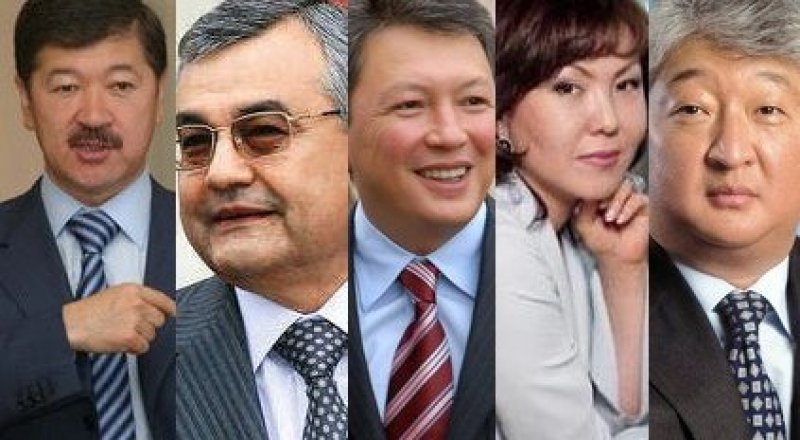
[Image: Five Kazakhs were listed in the Forbes Billionaire List for 2016]
Before others start "rediscovering" our country, we need to rediscover it for ourselves. We need a complete restart – not just a rebranding, but a complete modernisation. Expensive projects such as the EXPO or Universiade are pointless. They simply eat up the nation's cash and energy. We have to live within our limits and stop pretending to be a superpower. Then the nation will be able to live well – not in some far-off 2050, but this year or next year.
That's why the programme I am promoting is called "Kazakhstan 2017". Next year there will be a new programme called "Kazakhstan 2018" – and so on, you get the idea. These programmes should be discussed by the whole populace, approved by the parliament and implemented by the government. They should be reflected our country's budget and investment projects.
The aims of each of our programmes are very simple: the health of the populace, growth of incomes, free education for everyone, decent living standards, population growth and guaranteed pensions in old age. If this is successful, it will bring politicians and business leaders to our country without any EXPOs. In fact, you can leave the "if" out – it really is possible!
DAT newspaper, March 16, 2017.




